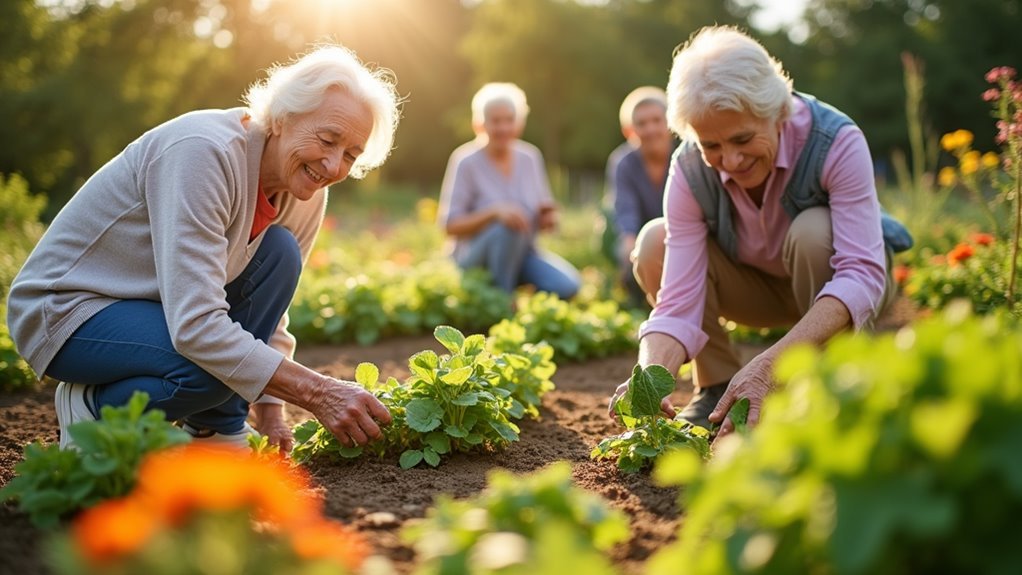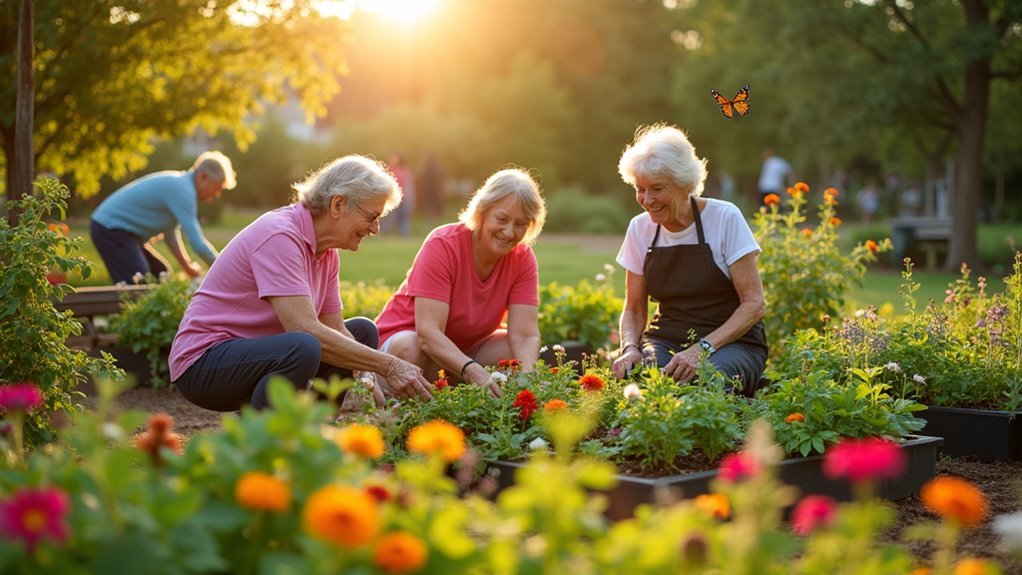Community gardens offer you the perfect wellness combination of gentle physical exercise, meaningful social connections, and fresh nutrition access. You’ll enjoy low-impact activities that improve flexibility and strength while connecting with neighbors through shared gardening experiences. The natural environment reduces your stress levels and provides therapeutic mental health benefits. You’ll gain access to fresh produce, learn new skills, and develop a strong sense of purpose and accomplishment. Continue exploring to uncover all the transformative benefits awaiting you.
Physical Activity and Exercise Benefits for Seniors

When you tend to a community garden, you’re engaging in a surprisingly thorough workout that targets multiple aspects of physical fitness. The physical activity involved in gardening provides exceptional exercise benefits for seniors through digging, planting, and weeding motions that enhance your flexibility, strength, and coordination.
Gardening delivers a complete workout through natural movements that build strength, flexibility, and coordination while staying gentle on aging bodies.
You’ll experience improved cardiovascular health and overall fitness through this low-impact exercise that’s perfectly suited to your abilities.
Regular gardening sessions help you develop increased muscle tone and bone strength while remaining gentle on your joints. Community gardens often feature raised planters that make participation accessible even with limited mobility.
As you continue gardening, you’ll notice boosted confidence in your physical capabilities and feel motivated to maintain a healthier lifestyle.
Mental Health and Stress Relief Through Gardening
When you step into a community garden, you’re immediately surrounded by nature’s inherent ability to calm your mind and lower your stress levels.
You’ll find that the simple act of tending to plants creates a natural form of mindfulness, where your focus shifts entirely to nurturing growth and observing the subtle changes in your garden.
This focused attention on plant care becomes a powerful meditation that helps quiet anxious thoughts and promotes emotional well-being.
Nature’s Calming Effects
As you step into a community garden and breathe in the fresh air, you’ll immediately notice how the natural environment begins to ease your mind and body.
Nature’s calming effects work immediately to reduce your anxiety and stress levels, creating a peaceful sanctuary that supports your mental health.
Community gardens offer more than just beautiful surroundings—they provide therapeutic spaces where your cognitive function improves through engaging gardening tasks.
These green environments enhance your overall physical wellness while fostering meaningful social interactions that create a genuine sense of belonging within your community.
- Mindful focus: Repetitive gardening tasks help you stay present and reduce worry
- Stress reduction: Natural settings considerably lower cortisol levels
- Enhanced memory: Plant care stimulates problem-solving skills and recall
- Emotional balance: Serene environments promote relaxation and reflection
Mindfulness Through Plant Care
The peaceful atmosphere that gardens naturally provide sets the perfect stage for developing deeper mindfulness through hands-on plant care. When you’re nurturing plants in a community setting, repetitive activities like planting and weeding create meditative experiences that enhance mental clarity and emotional well-being.
| Activity | Mindfulness Benefit | Health Impact |
|---|---|---|
| Planting seeds | Present-moment focus | Improved cognitive function |
| Daily watering | Routine meditation | Enhanced stress relief |
| Pruning plants | Mindful attention | Better mental clarity |
| Harvesting crops | Sense of accomplishment | Boosted self-esteem |
You’ll discover that caring for plants stimulates problem-solving skills while encouraging memory recall. This combination strengthens cognitive function and provides meaningful emotional expression. The nurturing process creates lasting stress relief while building connections with fellow gardeners in your community setting.
Social Connections and Community Building

When you join a community garden, you’re not just tending plants—you’re cultivating relationships that can transform your social life.
You’ll find yourself working alongside neighbors of all ages, sharing gardening tips, stories, and laughter while building genuine connections.
These shared experiences create a strong foundation for lasting friendships and a more vibrant, supportive community network.
Building Meaningful Friendships
While many seniors struggle with isolation in their later years, community gardens offer a natural remedy through shared purpose and daily interactions.
You’ll discover that working alongside other older adults creates authentic social connections that naturally evolve into meaningful friendships. When you participate in gardening activities together, you’re building relationships through teamwork and shared accomplishments.
Your sense of belonging strengthens as you collaborate on planting, weeding, and harvesting. These shared experiences create bonds that extend beyond the garden, fostering a supportive community network that enhances your overall wellness.
- Shared goals create natural conversation starters and common ground
- Regular garden meetings establish consistent social interaction opportunities
- Working together on projects builds trust and mutual respect
- Celebrating harvest successes strengthens interpersonal bonds
Strengthening Community Bonds
Beyond individual friendships, community gardens transform entire neighborhoods by weaving seniors into a vibrant social fabric that strengthens with each season.
You’ll discover that your community garden becomes a shared space where senior wellness flourishes through meaningful social interaction. When you participate in teamwork activities like planning seasonal plantings or organizing harvest festivals, you’re building relationships that extend far beyond garden boundaries.
Your sense of community deepens as you take pride in maintaining this collective space. Working alongside neighbors helps reduce feelings of isolation while creating lasting bonds with fellow gardeners.
You’ll find that these collaborative efforts foster cooperation and mutual support, turning strangers into trusted companions who share both gardening knowledge and life experiences within your thriving neighborhood community.
Skill Development and Lifelong Learning Opportunities
As you step into a community garden, you’re entering a dynamic classroom where learning never stops.
These green spaces offer exceptional skill development opportunities that keep your mind sharp and engaged. You’ll master new gardening techniques while enhancing your cognitive function through problem-solving and decision-making activities.
Educational workshops connect you with experienced gardeners who share invaluable knowledge about plant care and organic methods.
Your lifelong learning journey expands as you develop new skills with gardening tools, improving fine motor coordination.
The community garden environment encourages you to explore eco-friendly gardening approaches that benefit both your health and the environment.
- Master sustainable practices like composting and water conservation
- Enhance memory recall through plant identification and care routines
- Build problem-solving abilities when addressing pest and disease challenges
- Develop environmental stewardship through hands-on ecological learning
Access to Fresh Produce and Healthy Eating

The bounty of fresh vegetables and fruits growing at your fingertips transforms your relationship with healthy eating. When you participate in a community garden, you’ll discover that access to fresh produce becomes effortless and rewarding.
Growing your own fresh produce at your fingertips creates an effortless and rewarding path to healthier eating habits.
Gardening provides seniors with direct exposure to nutritious food while fostering deeper appreciation for wholesome meals. You’ll naturally expand your diet to include more diverse fruits and vegetables, creating a truly balanced diet.
The benefits of gardening extend beyond nutrition – you’ll greatly reduce grocery expenses while ensuring food security in your neighborhood.
As you actively grow and harvest your own produce, you’ll develop stronger connections to what you eat. This hands-on experience encourages healthier food choices and makes nutritious eating both accessible and enjoyable for your daily lifestyle.
Sense of Purpose and Personal Accomplishment
Watching tiny seeds transform into flourishing plants creates an unmatched feeling of personal accomplishment that deeply resonates with seniors in community gardens.
You’ll experience enhanced mental well-being as you witness flowers bloom and harvest fresh produce from your dedicated efforts. This tangible progress builds self-esteem while cultivating a genuine sense of purpose through meaningful contribution to your community.
Setting and achieving gardening goals reinforces positive motivation patterns that boost life satisfaction. Your ownership and responsibility within these shared spaces increase daily engagement and fulfillment.
- Goal Achievement: Successfully growing plants from seed to harvest provides measurable accomplishments that build confidence
- Community Contribution: Your efforts beautify neighborhoods and provide fresh produce for others
- Personal Growth: Nurturing plants enhances self-worth through visible, tangible results
- Active Engagement: Taking ownership increases motivation and daily purpose
Frequently Asked Questions
What Are 3 Benefits of a Community Garden?
You’ll access fresh, nutritious food that improves your diet quality. You’ll engage in physical activity that maintains your mobility and strength. You’ll experience social interaction that reduces isolation and loneliness.
How Can Community Gardens Improve Health?
You’ll improve your health through community gardens by accessing fresh produce for better nutrition, getting physical exercise from gardening tasks, reducing stress through therapeutic activities, and enhancing mental well-being.
What Are the Positive Aging Benefits of Home and Community Gardening Activities?
You’ll experience improved physical fitness, enhanced cognitive function, and stronger social connections through gardening. These activities boost your self-esteem, reduce stress, and provide fresh produce for better nutrition and overall wellness.
Which of the Following Benefits Does Gardening Lead to for Older Adults?
You’ll experience improved physical health through low-impact exercise that strengthens flexibility and cardiovascular function. Gardening also enhances your mental well-being by stimulating cognitive thinking, boosting self-esteem, and providing fresh, nutritious food.
In Summary
You’ll find that community gardens offer you the perfect blend of physical activity, mental wellness, and social connection. They’re not just about growing plants—you’re cultivating friendships, learning new skills, and gaining access to fresh, healthy food. Most importantly, you’ll discover a renewed sense of purpose and accomplishment that comes from nurturing life and contributing to your community’s wellbeing.





Leave a Reply